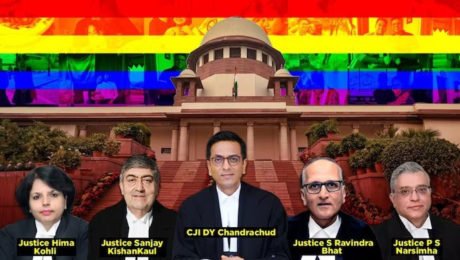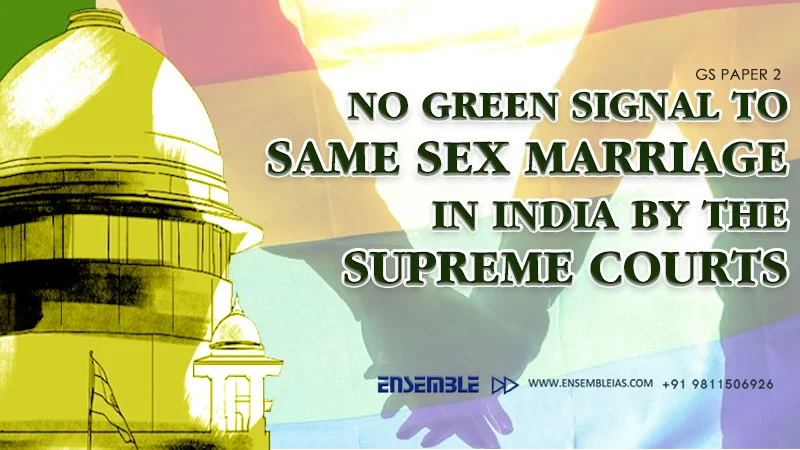Same Sex Marriage in India
Why in the news?
- Judgement on same-sex marriage was announced on 17-oct-23 by the Supreme Court. The Supreme Court declined to uphold the freedom of same-sex couples to get married or form civil unions.
- DY Chandrachud, the Chief Justice of India, presided over a five-judge panel of the Supreme Court that decided 3:2 against civil unions for couples who are not heterosexual.
- This bench has Five other members Sanjay Kishan Kaul, S Ravindra Bhat, Hima Kohli and PS Narasimha along with Chief Justice of India (CJI) DY Chandrachud.
- There were 20 petitions filed to challenge the Special Marriage Act (SMA), of 1954, the Foreign Marriage Act of 1969 and the Hindu Marriage Act of 1955.

What is Same-Sex Marriage?
The legally recognized union of two people who are the same sex or gender is known as a same-sex marriage, commonly referred to as a gay marriage or marriage equality. In a same-sex marriage, two people of the same gender can form a legally recognized relationship with the same rights and obligations as opposite-sex couples in many jurisdictions. Only 32 countries have approved same-sex marriage.
What is the Special Marriage Act of 1954?
The Government of India passed the Indian Special Marriage Act, 1954 as a piece of legislation to establish a legal framework for the solemnization of weddings between individuals from different religious or social groups. This law was put into place to accommodate India’s many different religious and cultural traditions and to permit interfaith or intercaste unions.
- Interfaith Marriages
- Registration
- Age Requirements
- Conditions
- Witnesses
- Solemnization
- Objections
- Certificate
- Written Notice
Hetero Sexual: – When someone has a sexual orientation known as heterosexuality, they are predominantly attracted emotionally and sexually to others of the same gender or a different gender.
Petition: – A petition is a formal, written request or appeal that is typically directed towards a governmental agency, court, or other decision-making body. Individuals or organizations use petitions to express their concerns, demand action, support a certain cause or demand certain actions or decisions from the receiver. It is an effective way to make your voice heard and to influence decision-making.
Petitioners: Petitioners are the ones or groups who initiate legal proceedings.
Government Action
- CJI leave this to parliament as SC cannot strike down SMA provisions.
- When this same-sex marriage law is implemented, it will have an impact on 160 laws that apply to couples.
- Central Government has opposed supporting the act stating that marriage is an act between a biological man and a woman. Rajasthan, Assam and Andhra Pradesh support the government’s statement.
- Before 2018, Same-Sex marriage was considered a criminal act by section 377, and the Supreme Court changed this to a non-criminal act over the high court.
Conclusion
In India, marriage is mostly based on traditional and religious customs, and it is defined as the union of a man and a woman. Same-sex marriage is not a criminal act but has become a debate & discussion topic and it is crucial to remember that the social and legal environment might change over time.
Best Online Coaching for Civil Service_IAS_ UPSC_IFS_IPS
Free Study Material ENSEMBLE IAS ACADEMY | Call +91 98115 06926 |
Visit us: – https://ensembleias.com/ | Online Store: https://online.ensemble.net.in/
#SMA #Same_sex_marraige #India #supreme_courte #trends_in_geography #explore_page #parliament #indian_government #Upsc_current_affairs #news #GSPaper #UPSC #ias #upsc_exam #civilservices #civil_services_study #ensemble_ias_academy #geography_optional #CJI #ias #upsc_exam #upsc_motivation #upsc_aspirants




